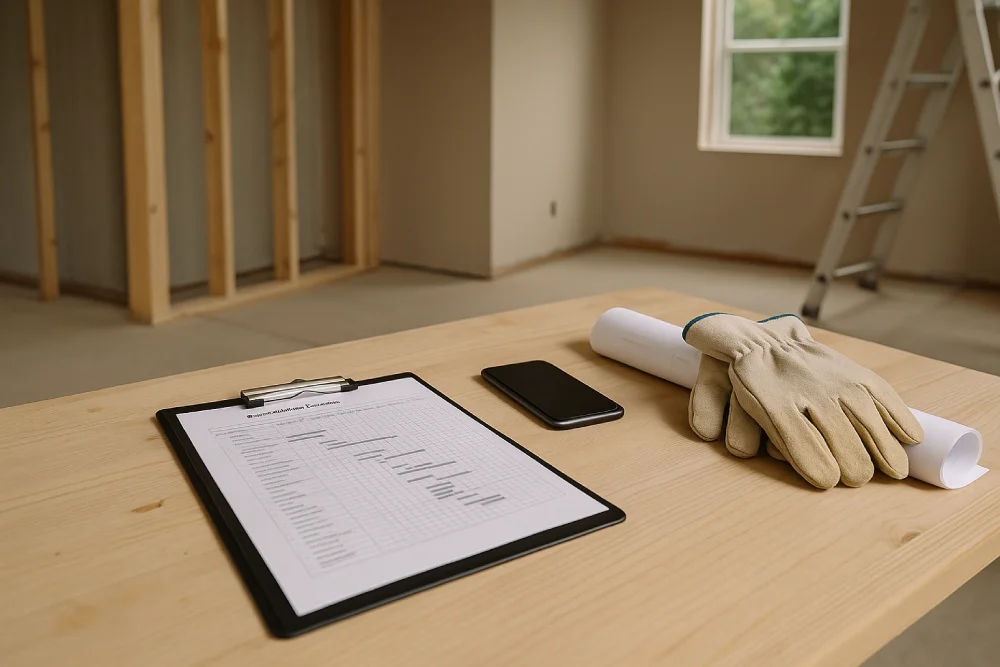
Great customer service on a jobsite relies on clear communication and set expectations. It involves educating clients throughout the project, ensuring they understand schedules and processes. Transparency is key, with regular updates showcasing progress and addressing concerns. Maintaining site safety and cleanliness is essential, as it impacts both productivity and trust. Proactive issue resolution, supported by technology, further enhances the client experience. Exploring these strategies can provide profound understanding into successful jobsite management.
Effective communication is essential for cultivating clear expectations on a jobsite, and it significantly impacts overall project success. A structured communication plan establishes protocols that facilitate information exchange, while regular updates keep everyone aligned with project goals. By defining roles and responsibilities, each team member knows their part in the communication hierarchy, promoting collaborative planning and responsive adaptability. Fewer errors can be achieved by utilizing technology, such as construction management platforms, which provides a unified source of information, ensuring stakeholders can access pivotal details. Additionally, employing quality-first approaches helps to protect homes and businesses during the roofing process. Timely and clear messaging, combined with regular meetings, nurtures an environment of open dialogue. These practices enhance accountability, allowing teams to address concerns swiftly and maintain project momentum, ultimately leading to a successful outcome.
A strong foundation in communication sets the stage for an equally important aspect of a successful construction project: client education and support. This phase is essential for empowering clients and ensuring they remain informed throughout the process. A well-structured approach includes:
These elements cultivate understanding and trust, ultimately enhancing client satisfaction. By prioritizing education and support, construction teams can create a positive experience, leading to successful project outcomes and lasting relationships. Furthermore, integrating best practices in client support ensures high standards of service and safety throughout the project.
Transparency in project updates serves as a cornerstone for successful construction management, ensuring clients remain informed and engaged throughout the project lifecycle. By implementing responsive project reporting, construction teams can provide regular, real-time updates that help clients make timely decisions. This transparency nurtures trust, as clients can see the project’s progress and identify potential issues early on. Utilizing construction management software enables seamless data integration, allowing stakeholders to access necessary information anytime and anywhere. Enhanced communication reduces misunderstandings, improving collaboration between clients and project teams. Additionally, maintaining clear communication channels ensures that all workers are on the same page and prioritizes project success. Ultimately, transparent updates lead to better project outcomes, increased stakeholder satisfaction, and more effective budget management, giving clients a greater sense of control over their projects and ensuring all parties remain accountable. This commitment to dependable project management is a hallmark of TriStar’s approach, ensuring that clients feel supported and informed every step of the way.
Successful construction management extends beyond transparent project updates; maintaining site safety and cleanliness is equally important. A well-organized site cultivates a productive environment and enhances worker safety. Key practices include:
Proactive issue resolution and client involvement serve as essential elements of effective jobsite management. Anticipating potential challenges while actively engaging clients enables teams to create a smoother workflow and prevent minor issues from escalating. Timely communication updates ensure clients feel informed and valued, cultivating a collaborative environment that enhances overall project success.
Anticipating potential challenges on a jobsite requires a strategic approach that prioritizes proactive issue resolution and client involvement. Effective anticipation hinges on two key components: risk assessment and data analysis. This can be bolstered through the following strategies:
Engaging clients actively on a jobsite is an important strategy for cultivating collaboration and ensuring project success. By managing client expectations through clear communication and regular feedback loops, construction teams can address concerns before they escalate. This proactive issue resolution nurtures an environment where clients feel valued and involved. Additionally, encouraging client participation in project planning enhances trust, as clients see their needs acknowledged and understood. Implementing systematic risk management also helps in predicting potential issues, allowing teams to mitigate risks effectively. Overall, building client trust requires transparency and consistent engagement, ensuring that clients remain informed and active partners throughout the project. This collaborative approach ultimately leads to a more successful and satisfying experience for all parties involved.
Timely communication updates play a crucial role in enhancing project outcomes and supporting client satisfaction on a jobsite. Effective communication promotes proactive issue resolution and guarantees that clients remain involved throughout the project. Key strategies include:
Gathering and responding to client feedback plays a vital role in aligning services with customer expectations. Actively seeking input allows companies to pinpoint areas needing enhancement and apply suggested changes to boost overall satisfaction. This approach fosters loyalty and equips businesses to adapt to the evolving needs of their clients.
Understanding the importance of client input is essential for any business aiming to augment its services and products. Collecting and acting on feedback leads to several key benefits:
Acting on client feedback is a vital step in enhancing service quality within the construction industry. Effective feedback mechanisms, such as structured surveys and digital tools, enable companies to collect actionable insights at various project stages. By integrating these insights into their processes, contractors can address client concerns promptly and accurately. Ongoing monitoring of customer satisfaction metrics, like net promoter scores, helps identify areas for improvement. Regular feedback sessions nurture transparency and a collaborative approach, leading to better decision-making. Ultimately, responding to client input not only improves service delivery but also builds trust and satisfaction. By prioritizing feedback, construction teams can guarantee continuous improvement and increase the overall quality of their projects.
In an era where technology is altering industries, leveraging advanced tools for enhanced customer service on jobsites has become essential. By embracing digital workforce management and data-driven decision-making, construction companies can significantly improve their service quality. Key strategies include:
These technological advancements not only facilitate effective communication but also lead to higher customer satisfaction and ultimately successful project outcomes.
Exceptional customer service on a job site hinges on clear communication, transparency, and a steadfast commitment to safety. By taking the time to educate clients and actively involve them in the process, we build trust and foster satisfaction. It’s essential to proactively address any issues that arise and to leverage technology to enhance the overall client experience. When we prioritize these principles, we not only ensure successful projects but also create lasting relationships, allowing clients to feel valued and confident in their decisions throughout the journey.
At TriStar Built, a locally owned and insured construction company based in North Texas, we embody these values in our quality-first approach. We focus on nurturing long-term relationships with our subcontractors and providing client-centered service that reflects our dedication to craftsmanship and trust.
A great customer experience relies on communication, consistency, and personalized support. Companies that deliver timely solutions and empower every employee to prioritize satisfaction often outperform competitors. Listening actively, offering flexible options, and following up after a service interaction helps ensure customers feel seen and valued.
In a customer service position, efficiency directly affects customer satisfaction. When support teams resolve issues quickly and accurately, clients receive better outcomes and faster responses. An efficiently run support department minimizes downtime and builds trust between brands and their customers.
Companies hiring for customer service jobs seek individuals who are naturally polite, solution-driven, and calm under pressure. They want professionals who can think on their feet, work collaboratively, and consistently deliver a good service experience across multiple touchpoints.
In the service industry, delivering better customer support means being proactive, not just reactive. It’s about understanding your client's expectations, communicating clearly, and providing the right solution the first time. Training employees to think like customers ensures empathy and action go hand in hand.
If you like to work with people and solve real problems daily, customer-facing roles can be very rewarding. These positions require patience, clarity, and a knack for multitasking—especially in the customer service or service industry, where each interaction helps shape brand reputation.
A superintendent helps coordinate fieldwork, contractors, and material suppliers, ensuring every job site operates efficiently. In industries like construction or facilities management, this role is essential for maintaining timelines and responding quickly to client needs—critical for a great customer experience.
Being polite remains a cornerstone of a good service experience. While speed and convenience are vital, customers still value respect and empathy. Whether you’re in retail, hospitality, or a customer service position, showing courtesy sets a positive tone for every interaction.
Material suppliers play a crucial behind-the-scenes role in enabling companies to deliver on-time results. In construction, logistics, or home improvement, delays in material sourcing can negatively affect the customer service chain. Reliable suppliers ensure a smoother project timeline and better end outcomes.
A high-performing support team doesn’t just react—they deliver the right solution quickly. Using CRM tools, predefined workflows, and self-service portals, modern teams streamline interactions. This not only improves service efficiency but also enhances the overall customer service experience.
Training employees for consistency involves more than just scripts. It’s about fostering critical thinking, emotional intelligence, and product knowledge. Well-prepared staff in a customer service role contribute to smoother communication, reduced friction, and a more efficiently operated service pipeline.

Whether you’re remodeling a home, expanding a business, or starting from the ground up, TriStar Built is here to guide you every step of the way. With a focus on craftsmanship, communication, and results that last, we make the construction process clear, smooth, and worth every investment.

LOCATION: 2126 James Street, Denton, TX 76205
PHONE: (940) 381-2222
© 2025 TRISTAR BUILT - ALL RIGHTS RESERVED | WEB DESIGN & SEO BY: Authority Solutions®